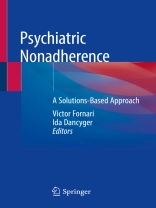This book explores medical nonadherence to treatment and management of psychiatric disorders across the lifespan. Leading experts in the field, specializing in a range of mental health problems describe the impact of nonadherence in the treatment of children, adolescents, transition age youths, adults, and older adults. The book eloquently articulates the key elements of effective physicians and offers clinical pearls on professionalism, empathy, and the doctor-patient relationship—a key component to solving treatment nonadherence. This volume focuses on solutions for improved clinical outcomes, including communication skills, empathy and building trust, motivational interviewing techniques and the use of technology.
Psychiatric Nonadherence is an excellent resource for all clinicians who care for individuals with psychiatric illness. This timely reference will provide guidance to enhance effective treatment adherence fora wide array of medical practitioners, including child and adolescent, adult forensic, and geriatric psychiatrists, addiction medicine specialists, primary care physicians, psychologists and nurses.
表中的内容
Personal Medical Neglect.- Nonadherence in Childhood disorders – Anxiety Disorders and ADHD.- Adolescents – Depression and Eating Disorders.- College age youth – first episodes and Bipolar disorders and Borderline PD.- Adults – Substance Abuse and Problem Drinking.- Older Adults – Depression and Dementia.- What contributes to a good doctor-patient relationship.- Do doctors know how to talk to their patients.- Empathy: How the patient recognizes whether the doctor cares. Professionalism: Can it be taught.- Mentoring and Professionalism in Training (MAP-IT).- Enhancing Humanism in Medicine (Gold Foundation).- Narrative Medicine – Teaching the doctor to understand the story.- Does anything make a difference.- Motivational Interviewing to confront the behavior and attempt to have the individual take personal responsibility for themselves.- How technology is now incorporated into clinical care.- Where do we go from here?.
关于作者
Victor Fornari MDDonald and Barbara Zucker School of Medicine at Hofstra/Northwell
Ida Dancyger Ph D Donald and Barbara Zucker School of Medicine at Hofstra/Northwell
Victor Fornari, MD, is the director of the merged Division of Child & Adolescent Psychiatry of North Shore University Hospital and Long Island Jewish Medical Center, including the Zucker Hillside Hospital and the Cohen Children’s Medical Center. He is also professor of Psychiatry and Pediatrics at at Hofstra North Shore-LIJ School of Medicine.












